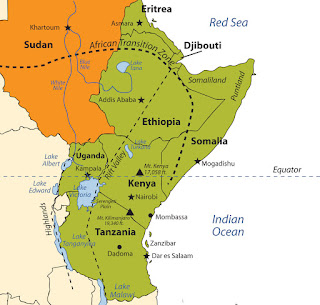Introductions to this blog series on East African water politics: My name is Mary Habtes and over the course of several weeks, I will explore the dynamics of water politics, riparian rights, development in conjunction with the growing political unsettlement within the region. I have chosen to focus on East African political issues relating to water for various reasons; firstly I have a emotional tie to the region coming from an East African background, I have seen and heard first hand the numerous economic, social and political issues that have resulted from poor governance, climate issues and stagnant economies and in many occasions water is the common denominator. In addition to this, East Africa has been a key region for water scarcity and heavily publicised since the late 90s due to the level of extreme poverty faced in the region. Much of this has been attributed to inadequate rainfall, extreme climate variabilities exacerbated by climate change, a lack of funding and investm...

